Exploring Challenges in Schizophrenia Treatment and Patient Care
VerifiedAdded on 2023/05/30
|11
|3128
|126
Essay
AI Summary
This essay provides a comprehensive overview of the challenges encountered in the treatment of schizophrenia. It explores various factors that hinder effective treatment, including patient-related determinants such as healthcare beliefs, lack of insight, and persecutory delusions. Medication-related challenges, such as side effects and insufficient medication, are also discussed. Furthermore, the essay highlights the impact of environmental factors, such as lack of caregiver support and high medication costs, on patient outcomes. Clinical-related determinants, like the importance of therapeutic alliance, are also analyzed. The paper discusses the side effects of antipsychotic drugs and their impact on patient adherence, as well as the emergence of newer medications with fewer side effects. Clinical implications of these challenges are considered, and the paper suggests alternative approaches, such as psychosocial interventions and family therapy, to improve patient care and outcomes. The essay underscores the importance of addressing these challenges to enhance the quality of life for individuals with schizophrenia.
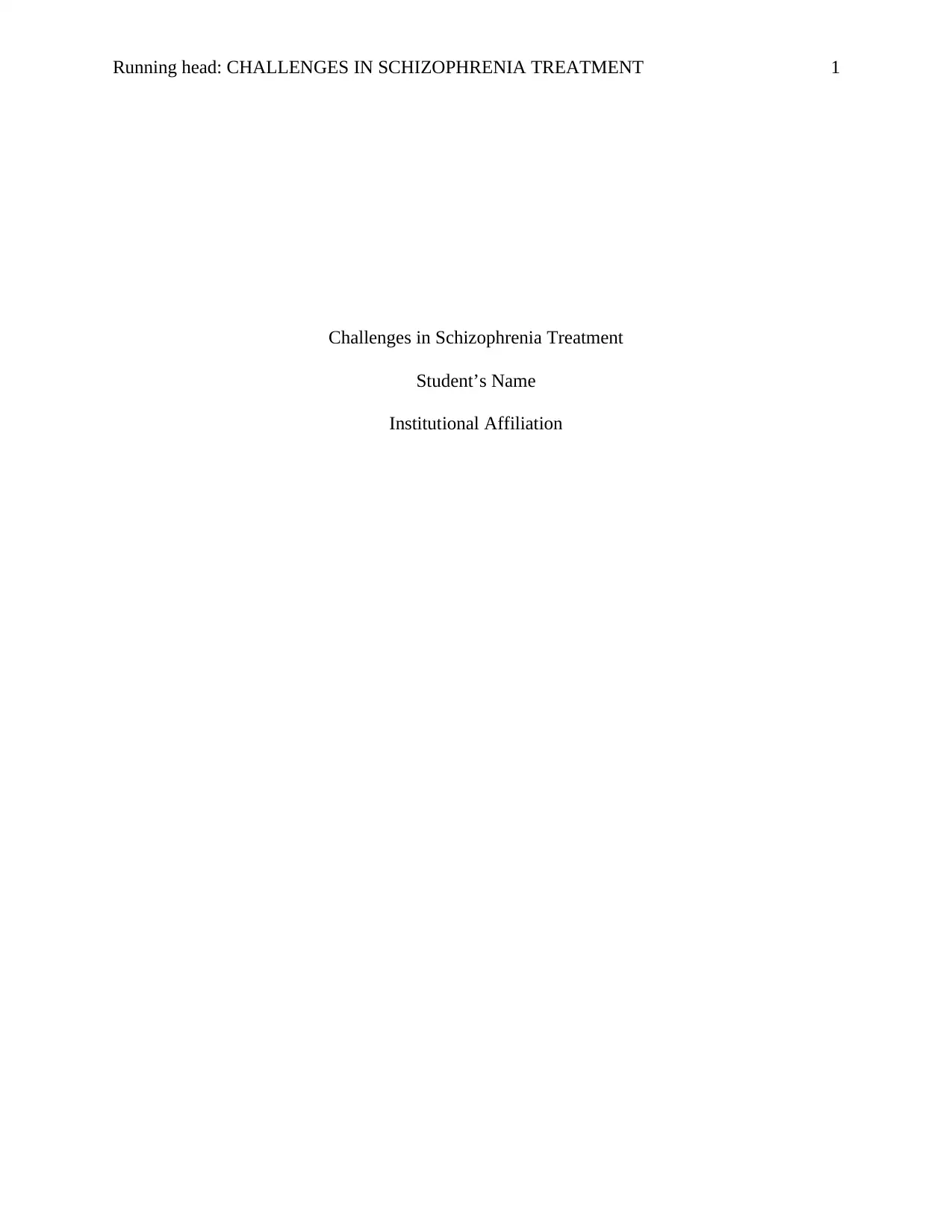
Running head: CHALLENGES IN SCHIZOPHRENIA TREATMENT 1
Challenges in Schizophrenia Treatment
Student’s Name
Institutional Affiliation
Challenges in Schizophrenia Treatment
Student’s Name
Institutional Affiliation
Paraphrase This Document
Need a fresh take? Get an instant paraphrase of this document with our AI Paraphraser
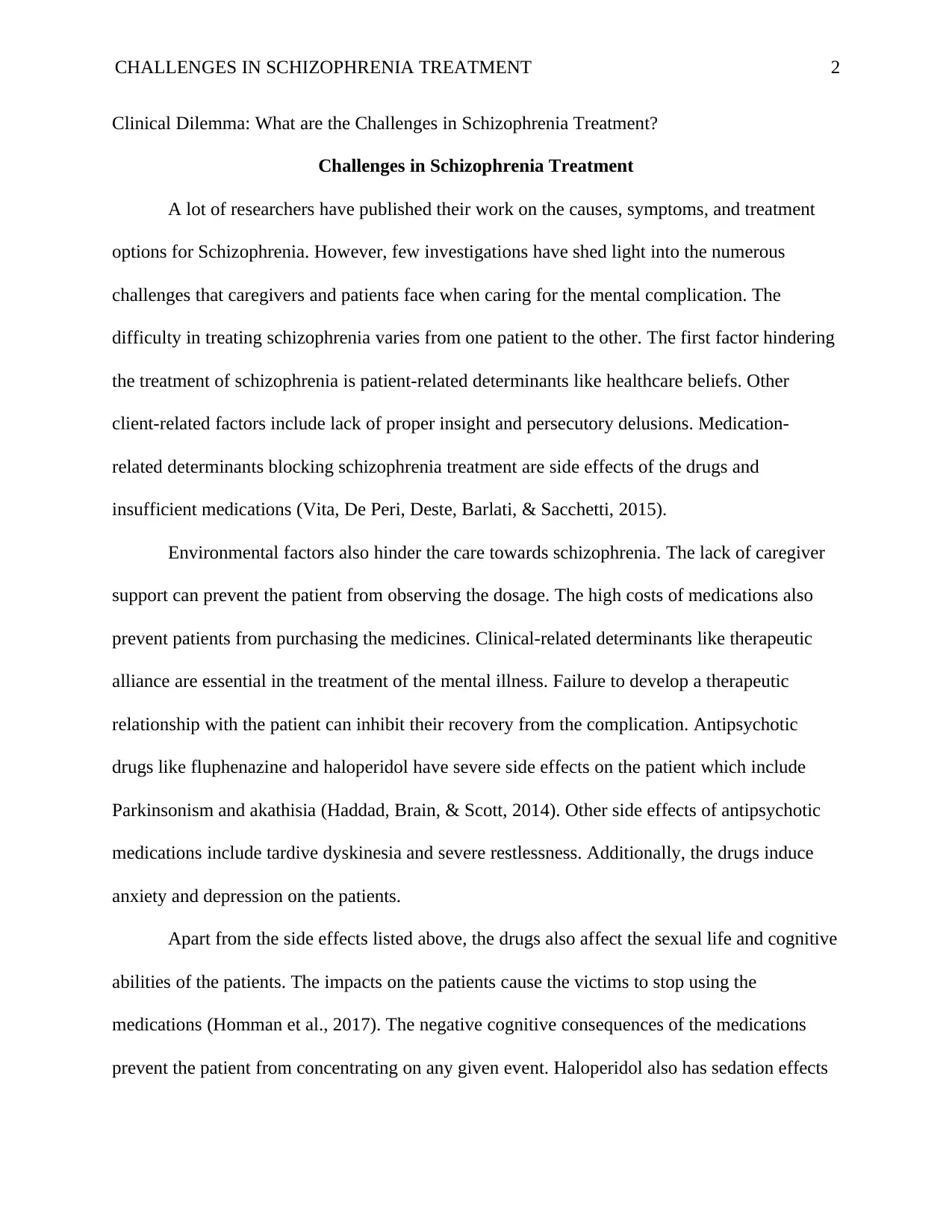
CHALLENGES IN SCHIZOPHRENIA TREATMENT 2
Clinical Dilemma: What are the Challenges in Schizophrenia Treatment?
Challenges in Schizophrenia Treatment
A lot of researchers have published their work on the causes, symptoms, and treatment
options for Schizophrenia. However, few investigations have shed light into the numerous
challenges that caregivers and patients face when caring for the mental complication. The
difficulty in treating schizophrenia varies from one patient to the other. The first factor hindering
the treatment of schizophrenia is patient-related determinants like healthcare beliefs. Other
client-related factors include lack of proper insight and persecutory delusions. Medication-
related determinants blocking schizophrenia treatment are side effects of the drugs and
insufficient medications (Vita, De Peri, Deste, Barlati, & Sacchetti, 2015).
Environmental factors also hinder the care towards schizophrenia. The lack of caregiver
support can prevent the patient from observing the dosage. The high costs of medications also
prevent patients from purchasing the medicines. Clinical-related determinants like therapeutic
alliance are essential in the treatment of the mental illness. Failure to develop a therapeutic
relationship with the patient can inhibit their recovery from the complication. Antipsychotic
drugs like fluphenazine and haloperidol have severe side effects on the patient which include
Parkinsonism and akathisia (Haddad, Brain, & Scott, 2014). Other side effects of antipsychotic
medications include tardive dyskinesia and severe restlessness. Additionally, the drugs induce
anxiety and depression on the patients.
Apart from the side effects listed above, the drugs also affect the sexual life and cognitive
abilities of the patients. The impacts on the patients cause the victims to stop using the
medications (Homman et al., 2017). The negative cognitive consequences of the medications
prevent the patient from concentrating on any given event. Haloperidol also has sedation effects
Clinical Dilemma: What are the Challenges in Schizophrenia Treatment?
Challenges in Schizophrenia Treatment
A lot of researchers have published their work on the causes, symptoms, and treatment
options for Schizophrenia. However, few investigations have shed light into the numerous
challenges that caregivers and patients face when caring for the mental complication. The
difficulty in treating schizophrenia varies from one patient to the other. The first factor hindering
the treatment of schizophrenia is patient-related determinants like healthcare beliefs. Other
client-related factors include lack of proper insight and persecutory delusions. Medication-
related determinants blocking schizophrenia treatment are side effects of the drugs and
insufficient medications (Vita, De Peri, Deste, Barlati, & Sacchetti, 2015).
Environmental factors also hinder the care towards schizophrenia. The lack of caregiver
support can prevent the patient from observing the dosage. The high costs of medications also
prevent patients from purchasing the medicines. Clinical-related determinants like therapeutic
alliance are essential in the treatment of the mental illness. Failure to develop a therapeutic
relationship with the patient can inhibit their recovery from the complication. Antipsychotic
drugs like fluphenazine and haloperidol have severe side effects on the patient which include
Parkinsonism and akathisia (Haddad, Brain, & Scott, 2014). Other side effects of antipsychotic
medications include tardive dyskinesia and severe restlessness. Additionally, the drugs induce
anxiety and depression on the patients.
Apart from the side effects listed above, the drugs also affect the sexual life and cognitive
abilities of the patients. The impacts on the patients cause the victims to stop using the
medications (Homman et al., 2017). The negative cognitive consequences of the medications
prevent the patient from concentrating on any given event. Haloperidol also has sedation effects
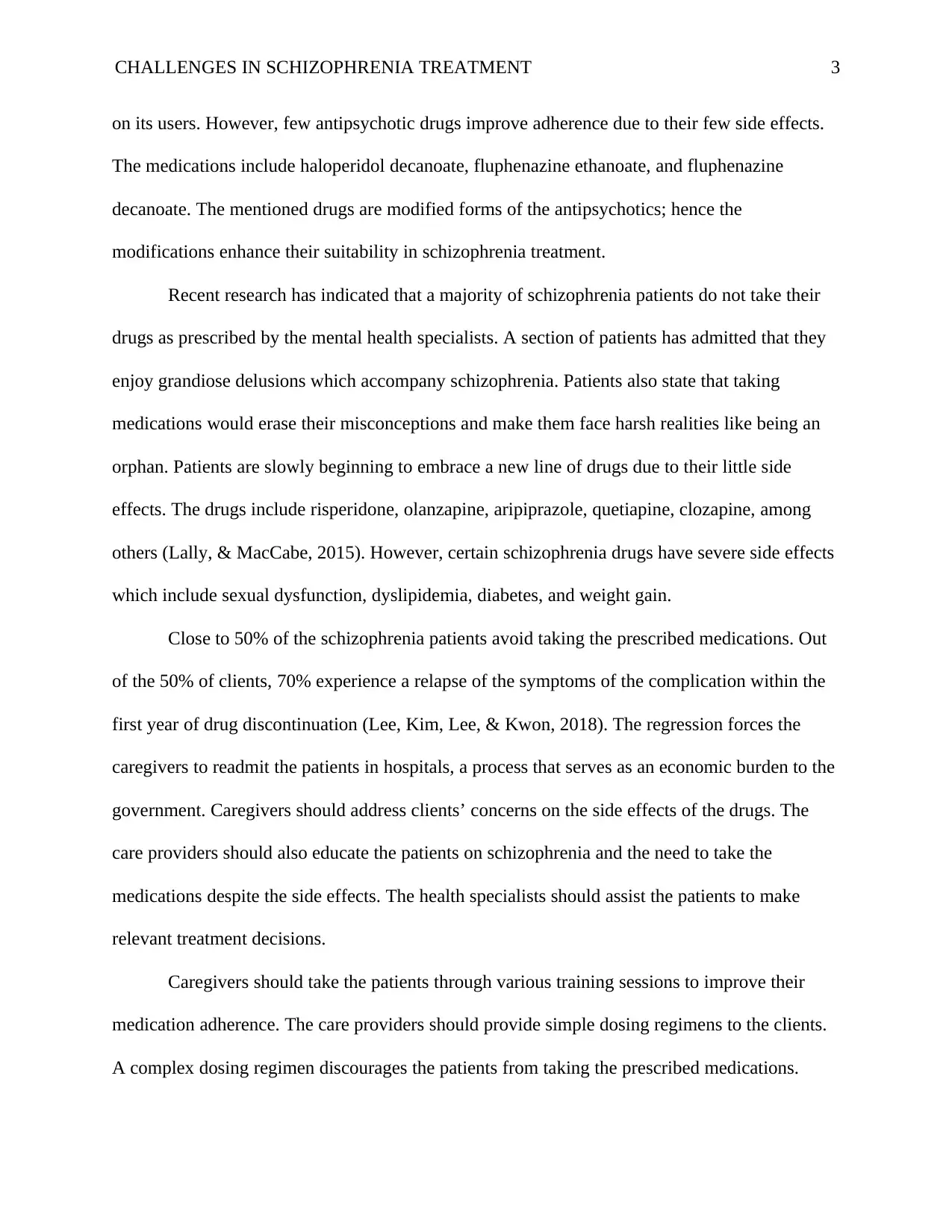
CHALLENGES IN SCHIZOPHRENIA TREATMENT 3
on its users. However, few antipsychotic drugs improve adherence due to their few side effects.
The medications include haloperidol decanoate, fluphenazine ethanoate, and fluphenazine
decanoate. The mentioned drugs are modified forms of the antipsychotics; hence the
modifications enhance their suitability in schizophrenia treatment.
Recent research has indicated that a majority of schizophrenia patients do not take their
drugs as prescribed by the mental health specialists. A section of patients has admitted that they
enjoy grandiose delusions which accompany schizophrenia. Patients also state that taking
medications would erase their misconceptions and make them face harsh realities like being an
orphan. Patients are slowly beginning to embrace a new line of drugs due to their little side
effects. The drugs include risperidone, olanzapine, aripiprazole, quetiapine, clozapine, among
others (Lally, & MacCabe, 2015). However, certain schizophrenia drugs have severe side effects
which include sexual dysfunction, dyslipidemia, diabetes, and weight gain.
Close to 50% of the schizophrenia patients avoid taking the prescribed medications. Out
of the 50% of clients, 70% experience a relapse of the symptoms of the complication within the
first year of drug discontinuation (Lee, Kim, Lee, & Kwon, 2018). The regression forces the
caregivers to readmit the patients in hospitals, a process that serves as an economic burden to the
government. Caregivers should address clients’ concerns on the side effects of the drugs. The
care providers should also educate the patients on schizophrenia and the need to take the
medications despite the side effects. The health specialists should assist the patients to make
relevant treatment decisions.
Caregivers should take the patients through various training sessions to improve their
medication adherence. The care providers should provide simple dosing regimens to the clients.
A complex dosing regimen discourages the patients from taking the prescribed medications.
on its users. However, few antipsychotic drugs improve adherence due to their few side effects.
The medications include haloperidol decanoate, fluphenazine ethanoate, and fluphenazine
decanoate. The mentioned drugs are modified forms of the antipsychotics; hence the
modifications enhance their suitability in schizophrenia treatment.
Recent research has indicated that a majority of schizophrenia patients do not take their
drugs as prescribed by the mental health specialists. A section of patients has admitted that they
enjoy grandiose delusions which accompany schizophrenia. Patients also state that taking
medications would erase their misconceptions and make them face harsh realities like being an
orphan. Patients are slowly beginning to embrace a new line of drugs due to their little side
effects. The drugs include risperidone, olanzapine, aripiprazole, quetiapine, clozapine, among
others (Lally, & MacCabe, 2015). However, certain schizophrenia drugs have severe side effects
which include sexual dysfunction, dyslipidemia, diabetes, and weight gain.
Close to 50% of the schizophrenia patients avoid taking the prescribed medications. Out
of the 50% of clients, 70% experience a relapse of the symptoms of the complication within the
first year of drug discontinuation (Lee, Kim, Lee, & Kwon, 2018). The regression forces the
caregivers to readmit the patients in hospitals, a process that serves as an economic burden to the
government. Caregivers should address clients’ concerns on the side effects of the drugs. The
care providers should also educate the patients on schizophrenia and the need to take the
medications despite the side effects. The health specialists should assist the patients to make
relevant treatment decisions.
Caregivers should take the patients through various training sessions to improve their
medication adherence. The care providers should provide simple dosing regimens to the clients.
A complex dosing regimen discourages the patients from taking the prescribed medications.
⊘ This is a preview!⊘
Do you want full access?
Subscribe today to unlock all pages.

Trusted by 1+ million students worldwide
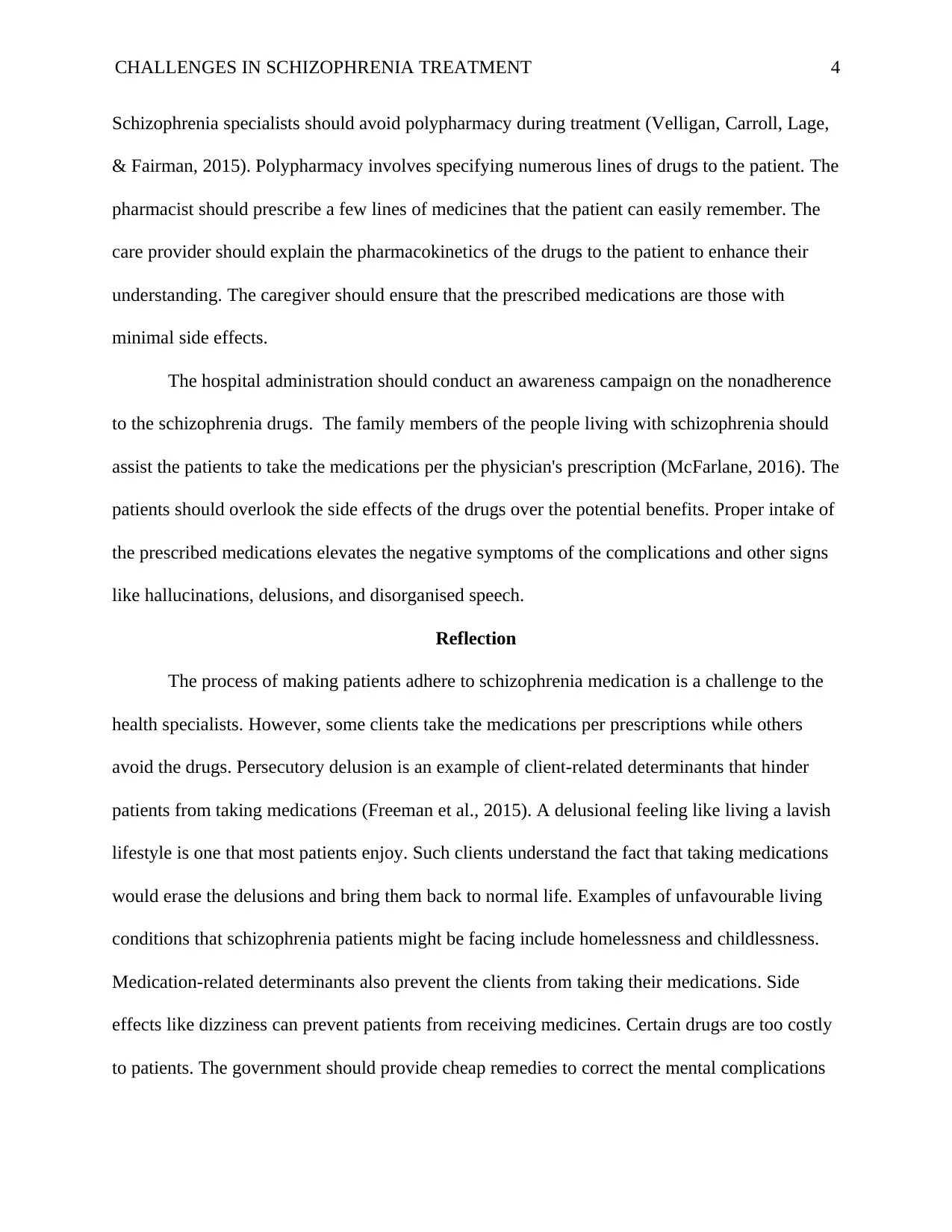
CHALLENGES IN SCHIZOPHRENIA TREATMENT 4
Schizophrenia specialists should avoid polypharmacy during treatment (Velligan, Carroll, Lage,
& Fairman, 2015). Polypharmacy involves specifying numerous lines of drugs to the patient. The
pharmacist should prescribe a few lines of medicines that the patient can easily remember. The
care provider should explain the pharmacokinetics of the drugs to the patient to enhance their
understanding. The caregiver should ensure that the prescribed medications are those with
minimal side effects.
The hospital administration should conduct an awareness campaign on the nonadherence
to the schizophrenia drugs. The family members of the people living with schizophrenia should
assist the patients to take the medications per the physician's prescription (McFarlane, 2016). The
patients should overlook the side effects of the drugs over the potential benefits. Proper intake of
the prescribed medications elevates the negative symptoms of the complications and other signs
like hallucinations, delusions, and disorganised speech.
Reflection
The process of making patients adhere to schizophrenia medication is a challenge to the
health specialists. However, some clients take the medications per prescriptions while others
avoid the drugs. Persecutory delusion is an example of client-related determinants that hinder
patients from taking medications (Freeman et al., 2015). A delusional feeling like living a lavish
lifestyle is one that most patients enjoy. Such clients understand the fact that taking medications
would erase the delusions and bring them back to normal life. Examples of unfavourable living
conditions that schizophrenia patients might be facing include homelessness and childlessness.
Medication-related determinants also prevent the clients from taking their medications. Side
effects like dizziness can prevent patients from receiving medicines. Certain drugs are too costly
to patients. The government should provide cheap remedies to correct the mental complications
Schizophrenia specialists should avoid polypharmacy during treatment (Velligan, Carroll, Lage,
& Fairman, 2015). Polypharmacy involves specifying numerous lines of drugs to the patient. The
pharmacist should prescribe a few lines of medicines that the patient can easily remember. The
care provider should explain the pharmacokinetics of the drugs to the patient to enhance their
understanding. The caregiver should ensure that the prescribed medications are those with
minimal side effects.
The hospital administration should conduct an awareness campaign on the nonadherence
to the schizophrenia drugs. The family members of the people living with schizophrenia should
assist the patients to take the medications per the physician's prescription (McFarlane, 2016). The
patients should overlook the side effects of the drugs over the potential benefits. Proper intake of
the prescribed medications elevates the negative symptoms of the complications and other signs
like hallucinations, delusions, and disorganised speech.
Reflection
The process of making patients adhere to schizophrenia medication is a challenge to the
health specialists. However, some clients take the medications per prescriptions while others
avoid the drugs. Persecutory delusion is an example of client-related determinants that hinder
patients from taking medications (Freeman et al., 2015). A delusional feeling like living a lavish
lifestyle is one that most patients enjoy. Such clients understand the fact that taking medications
would erase the delusions and bring them back to normal life. Examples of unfavourable living
conditions that schizophrenia patients might be facing include homelessness and childlessness.
Medication-related determinants also prevent the clients from taking their medications. Side
effects like dizziness can prevent patients from receiving medicines. Certain drugs are too costly
to patients. The government should provide cheap remedies to correct the mental complications
Paraphrase This Document
Need a fresh take? Get an instant paraphrase of this document with our AI Paraphraser
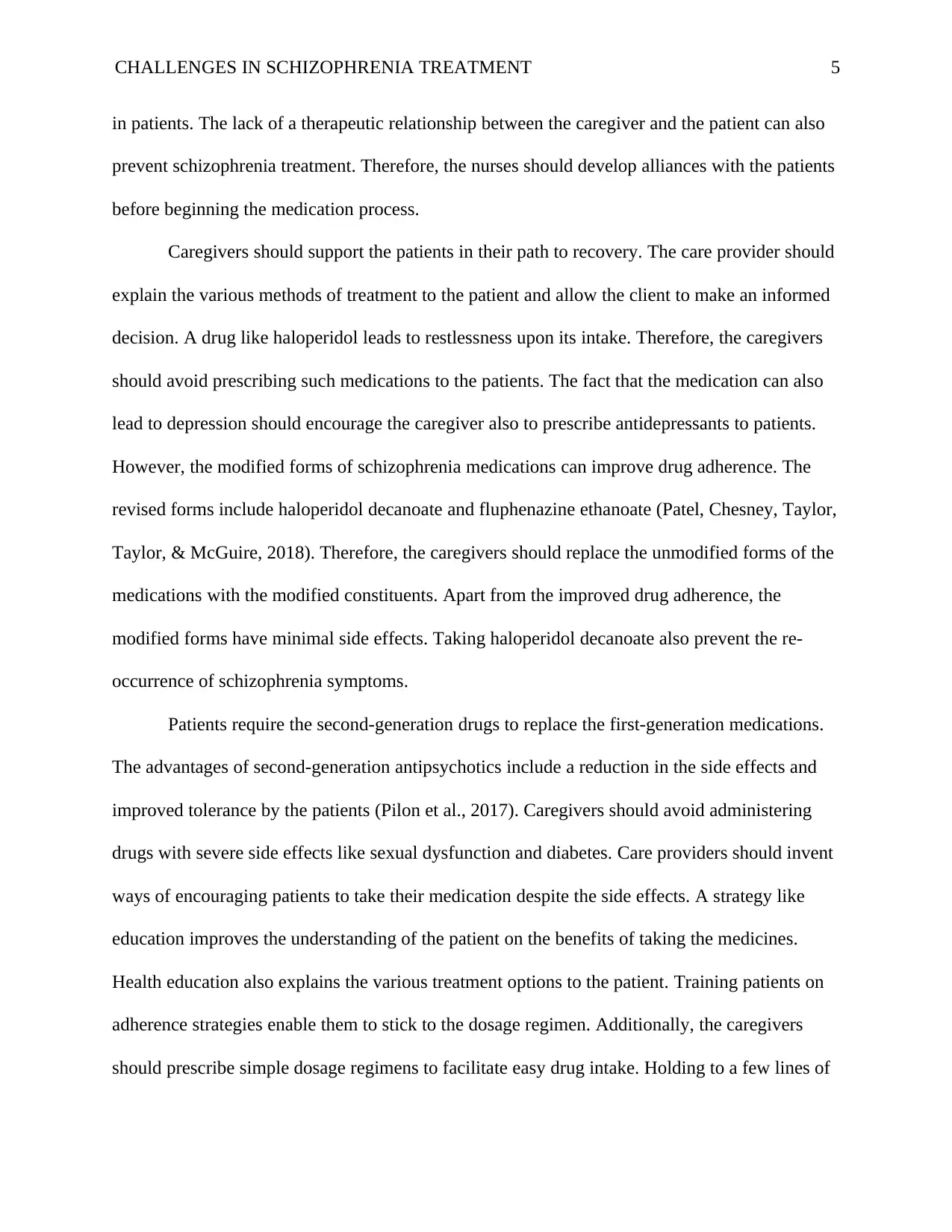
CHALLENGES IN SCHIZOPHRENIA TREATMENT 5
in patients. The lack of a therapeutic relationship between the caregiver and the patient can also
prevent schizophrenia treatment. Therefore, the nurses should develop alliances with the patients
before beginning the medication process.
Caregivers should support the patients in their path to recovery. The care provider should
explain the various methods of treatment to the patient and allow the client to make an informed
decision. A drug like haloperidol leads to restlessness upon its intake. Therefore, the caregivers
should avoid prescribing such medications to the patients. The fact that the medication can also
lead to depression should encourage the caregiver also to prescribe antidepressants to patients.
However, the modified forms of schizophrenia medications can improve drug adherence. The
revised forms include haloperidol decanoate and fluphenazine ethanoate (Patel, Chesney, Taylor,
Taylor, & McGuire, 2018). Therefore, the caregivers should replace the unmodified forms of the
medications with the modified constituents. Apart from the improved drug adherence, the
modified forms have minimal side effects. Taking haloperidol decanoate also prevent the re-
occurrence of schizophrenia symptoms.
Patients require the second-generation drugs to replace the first-generation medications.
The advantages of second-generation antipsychotics include a reduction in the side effects and
improved tolerance by the patients (Pilon et al., 2017). Caregivers should avoid administering
drugs with severe side effects like sexual dysfunction and diabetes. Care providers should invent
ways of encouraging patients to take their medication despite the side effects. A strategy like
education improves the understanding of the patient on the benefits of taking the medicines.
Health education also explains the various treatment options to the patient. Training patients on
adherence strategies enable them to stick to the dosage regimen. Additionally, the caregivers
should prescribe simple dosage regimens to facilitate easy drug intake. Holding to a few lines of
in patients. The lack of a therapeutic relationship between the caregiver and the patient can also
prevent schizophrenia treatment. Therefore, the nurses should develop alliances with the patients
before beginning the medication process.
Caregivers should support the patients in their path to recovery. The care provider should
explain the various methods of treatment to the patient and allow the client to make an informed
decision. A drug like haloperidol leads to restlessness upon its intake. Therefore, the caregivers
should avoid prescribing such medications to the patients. The fact that the medication can also
lead to depression should encourage the caregiver also to prescribe antidepressants to patients.
However, the modified forms of schizophrenia medications can improve drug adherence. The
revised forms include haloperidol decanoate and fluphenazine ethanoate (Patel, Chesney, Taylor,
Taylor, & McGuire, 2018). Therefore, the caregivers should replace the unmodified forms of the
medications with the modified constituents. Apart from the improved drug adherence, the
modified forms have minimal side effects. Taking haloperidol decanoate also prevent the re-
occurrence of schizophrenia symptoms.
Patients require the second-generation drugs to replace the first-generation medications.
The advantages of second-generation antipsychotics include a reduction in the side effects and
improved tolerance by the patients (Pilon et al., 2017). Caregivers should avoid administering
drugs with severe side effects like sexual dysfunction and diabetes. Care providers should invent
ways of encouraging patients to take their medication despite the side effects. A strategy like
education improves the understanding of the patient on the benefits of taking the medicines.
Health education also explains the various treatment options to the patient. Training patients on
adherence strategies enable them to stick to the dosage regimen. Additionally, the caregivers
should prescribe simple dosage regimens to facilitate easy drug intake. Holding to a few lines of
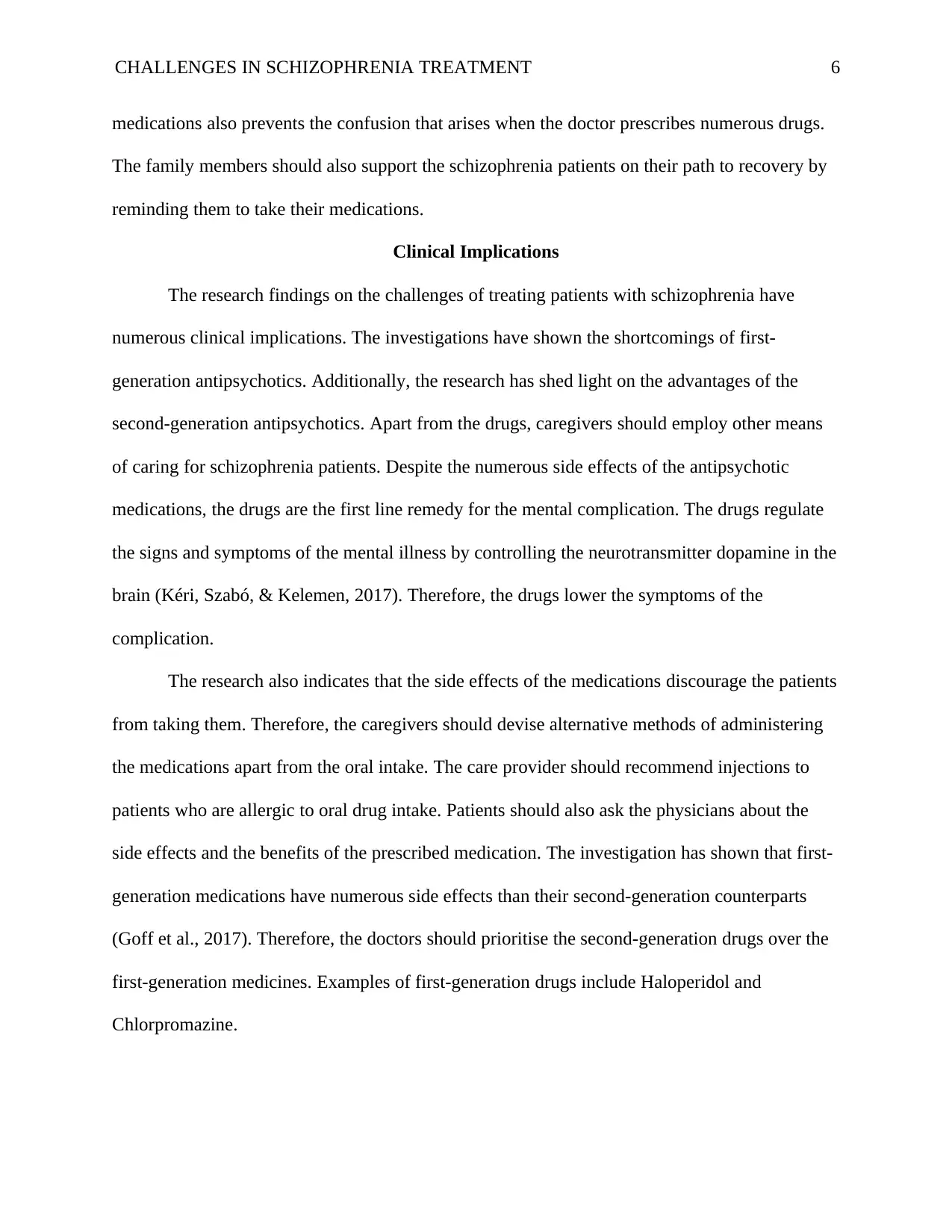
CHALLENGES IN SCHIZOPHRENIA TREATMENT 6
medications also prevents the confusion that arises when the doctor prescribes numerous drugs.
The family members should also support the schizophrenia patients on their path to recovery by
reminding them to take their medications.
Clinical Implications
The research findings on the challenges of treating patients with schizophrenia have
numerous clinical implications. The investigations have shown the shortcomings of first-
generation antipsychotics. Additionally, the research has shed light on the advantages of the
second-generation antipsychotics. Apart from the drugs, caregivers should employ other means
of caring for schizophrenia patients. Despite the numerous side effects of the antipsychotic
medications, the drugs are the first line remedy for the mental complication. The drugs regulate
the signs and symptoms of the mental illness by controlling the neurotransmitter dopamine in the
brain (Kéri, Szabó, & Kelemen, 2017). Therefore, the drugs lower the symptoms of the
complication.
The research also indicates that the side effects of the medications discourage the patients
from taking them. Therefore, the caregivers should devise alternative methods of administering
the medications apart from the oral intake. The care provider should recommend injections to
patients who are allergic to oral drug intake. Patients should also ask the physicians about the
side effects and the benefits of the prescribed medication. The investigation has shown that first-
generation medications have numerous side effects than their second-generation counterparts
(Goff et al., 2017). Therefore, the doctors should prioritise the second-generation drugs over the
first-generation medicines. Examples of first-generation drugs include Haloperidol and
Chlorpromazine.
medications also prevents the confusion that arises when the doctor prescribes numerous drugs.
The family members should also support the schizophrenia patients on their path to recovery by
reminding them to take their medications.
Clinical Implications
The research findings on the challenges of treating patients with schizophrenia have
numerous clinical implications. The investigations have shown the shortcomings of first-
generation antipsychotics. Additionally, the research has shed light on the advantages of the
second-generation antipsychotics. Apart from the drugs, caregivers should employ other means
of caring for schizophrenia patients. Despite the numerous side effects of the antipsychotic
medications, the drugs are the first line remedy for the mental complication. The drugs regulate
the signs and symptoms of the mental illness by controlling the neurotransmitter dopamine in the
brain (Kéri, Szabó, & Kelemen, 2017). Therefore, the drugs lower the symptoms of the
complication.
The research also indicates that the side effects of the medications discourage the patients
from taking them. Therefore, the caregivers should devise alternative methods of administering
the medications apart from the oral intake. The care provider should recommend injections to
patients who are allergic to oral drug intake. Patients should also ask the physicians about the
side effects and the benefits of the prescribed medication. The investigation has shown that first-
generation medications have numerous side effects than their second-generation counterparts
(Goff et al., 2017). Therefore, the doctors should prioritise the second-generation drugs over the
first-generation medicines. Examples of first-generation drugs include Haloperidol and
Chlorpromazine.
⊘ This is a preview!⊘
Do you want full access?
Subscribe today to unlock all pages.

Trusted by 1+ million students worldwide
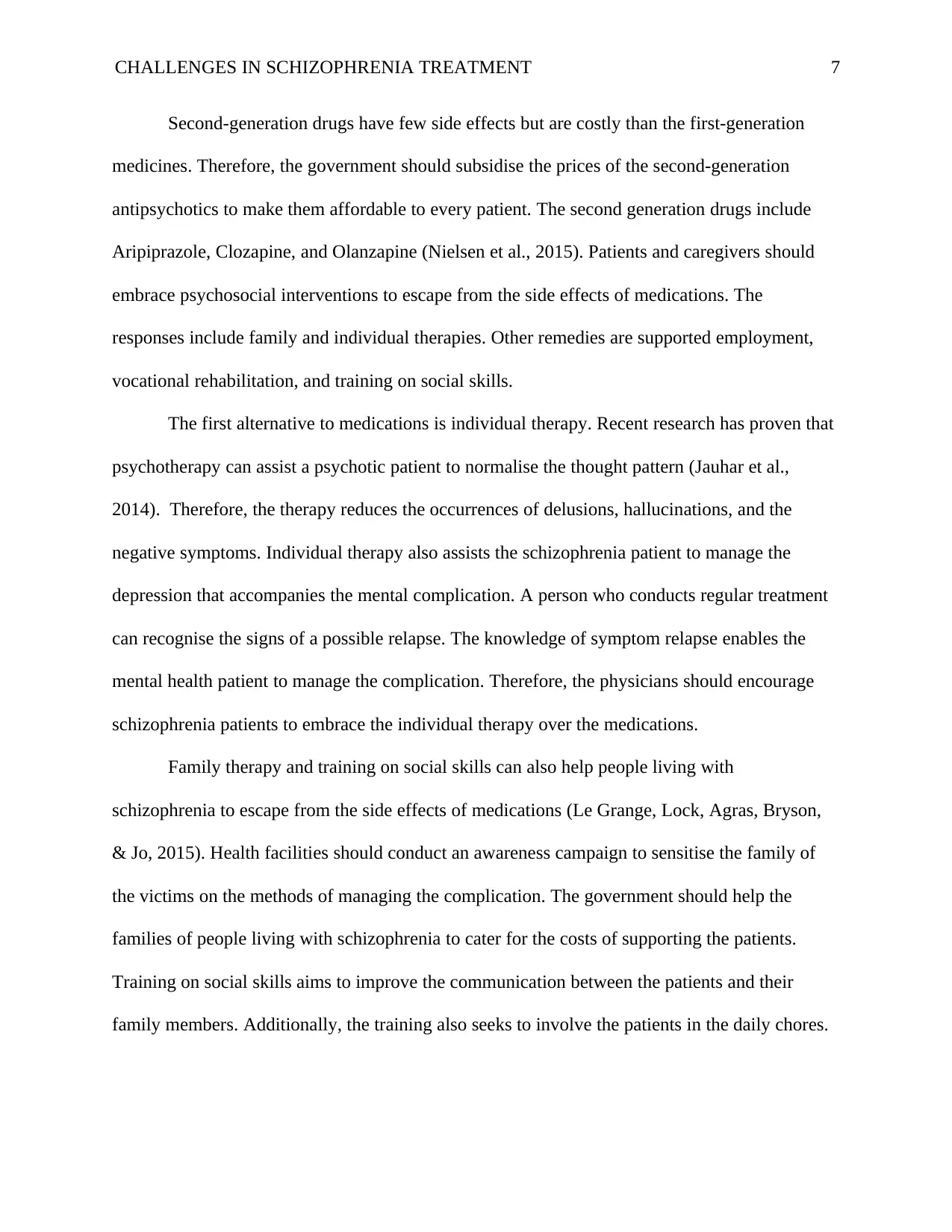
CHALLENGES IN SCHIZOPHRENIA TREATMENT 7
Second-generation drugs have few side effects but are costly than the first-generation
medicines. Therefore, the government should subsidise the prices of the second-generation
antipsychotics to make them affordable to every patient. The second generation drugs include
Aripiprazole, Clozapine, and Olanzapine (Nielsen et al., 2015). Patients and caregivers should
embrace psychosocial interventions to escape from the side effects of medications. The
responses include family and individual therapies. Other remedies are supported employment,
vocational rehabilitation, and training on social skills.
The first alternative to medications is individual therapy. Recent research has proven that
psychotherapy can assist a psychotic patient to normalise the thought pattern (Jauhar et al.,
2014). Therefore, the therapy reduces the occurrences of delusions, hallucinations, and the
negative symptoms. Individual therapy also assists the schizophrenia patient to manage the
depression that accompanies the mental complication. A person who conducts regular treatment
can recognise the signs of a possible relapse. The knowledge of symptom relapse enables the
mental health patient to manage the complication. Therefore, the physicians should encourage
schizophrenia patients to embrace the individual therapy over the medications.
Family therapy and training on social skills can also help people living with
schizophrenia to escape from the side effects of medications (Le Grange, Lock, Agras, Bryson,
& Jo, 2015). Health facilities should conduct an awareness campaign to sensitise the family of
the victims on the methods of managing the complication. The government should help the
families of people living with schizophrenia to cater for the costs of supporting the patients.
Training on social skills aims to improve the communication between the patients and their
family members. Additionally, the training also seeks to involve the patients in the daily chores.
Second-generation drugs have few side effects but are costly than the first-generation
medicines. Therefore, the government should subsidise the prices of the second-generation
antipsychotics to make them affordable to every patient. The second generation drugs include
Aripiprazole, Clozapine, and Olanzapine (Nielsen et al., 2015). Patients and caregivers should
embrace psychosocial interventions to escape from the side effects of medications. The
responses include family and individual therapies. Other remedies are supported employment,
vocational rehabilitation, and training on social skills.
The first alternative to medications is individual therapy. Recent research has proven that
psychotherapy can assist a psychotic patient to normalise the thought pattern (Jauhar et al.,
2014). Therefore, the therapy reduces the occurrences of delusions, hallucinations, and the
negative symptoms. Individual therapy also assists the schizophrenia patient to manage the
depression that accompanies the mental complication. A person who conducts regular treatment
can recognise the signs of a possible relapse. The knowledge of symptom relapse enables the
mental health patient to manage the complication. Therefore, the physicians should encourage
schizophrenia patients to embrace the individual therapy over the medications.
Family therapy and training on social skills can also help people living with
schizophrenia to escape from the side effects of medications (Le Grange, Lock, Agras, Bryson,
& Jo, 2015). Health facilities should conduct an awareness campaign to sensitise the family of
the victims on the methods of managing the complication. The government should help the
families of people living with schizophrenia to cater for the costs of supporting the patients.
Training on social skills aims to improve the communication between the patients and their
family members. Additionally, the training also seeks to involve the patients in the daily chores.
Paraphrase This Document
Need a fresh take? Get an instant paraphrase of this document with our AI Paraphraser
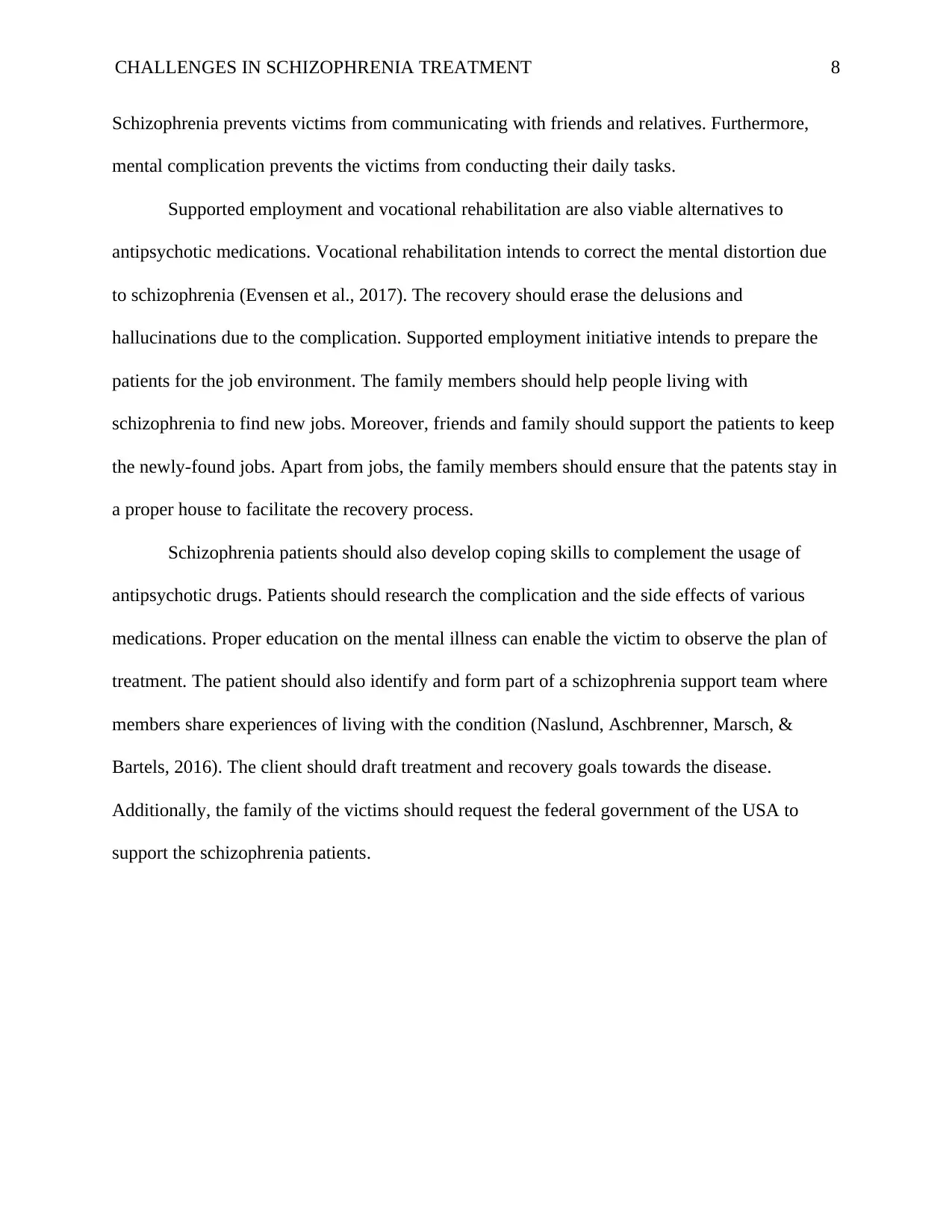
CHALLENGES IN SCHIZOPHRENIA TREATMENT 8
Schizophrenia prevents victims from communicating with friends and relatives. Furthermore,
mental complication prevents the victims from conducting their daily tasks.
Supported employment and vocational rehabilitation are also viable alternatives to
antipsychotic medications. Vocational rehabilitation intends to correct the mental distortion due
to schizophrenia (Evensen et al., 2017). The recovery should erase the delusions and
hallucinations due to the complication. Supported employment initiative intends to prepare the
patients for the job environment. The family members should help people living with
schizophrenia to find new jobs. Moreover, friends and family should support the patients to keep
the newly-found jobs. Apart from jobs, the family members should ensure that the patents stay in
a proper house to facilitate the recovery process.
Schizophrenia patients should also develop coping skills to complement the usage of
antipsychotic drugs. Patients should research the complication and the side effects of various
medications. Proper education on the mental illness can enable the victim to observe the plan of
treatment. The patient should also identify and form part of a schizophrenia support team where
members share experiences of living with the condition (Naslund, Aschbrenner, Marsch, &
Bartels, 2016). The client should draft treatment and recovery goals towards the disease.
Additionally, the family of the victims should request the federal government of the USA to
support the schizophrenia patients.
Schizophrenia prevents victims from communicating with friends and relatives. Furthermore,
mental complication prevents the victims from conducting their daily tasks.
Supported employment and vocational rehabilitation are also viable alternatives to
antipsychotic medications. Vocational rehabilitation intends to correct the mental distortion due
to schizophrenia (Evensen et al., 2017). The recovery should erase the delusions and
hallucinations due to the complication. Supported employment initiative intends to prepare the
patients for the job environment. The family members should help people living with
schizophrenia to find new jobs. Moreover, friends and family should support the patients to keep
the newly-found jobs. Apart from jobs, the family members should ensure that the patents stay in
a proper house to facilitate the recovery process.
Schizophrenia patients should also develop coping skills to complement the usage of
antipsychotic drugs. Patients should research the complication and the side effects of various
medications. Proper education on the mental illness can enable the victim to observe the plan of
treatment. The patient should also identify and form part of a schizophrenia support team where
members share experiences of living with the condition (Naslund, Aschbrenner, Marsch, &
Bartels, 2016). The client should draft treatment and recovery goals towards the disease.
Additionally, the family of the victims should request the federal government of the USA to
support the schizophrenia patients.
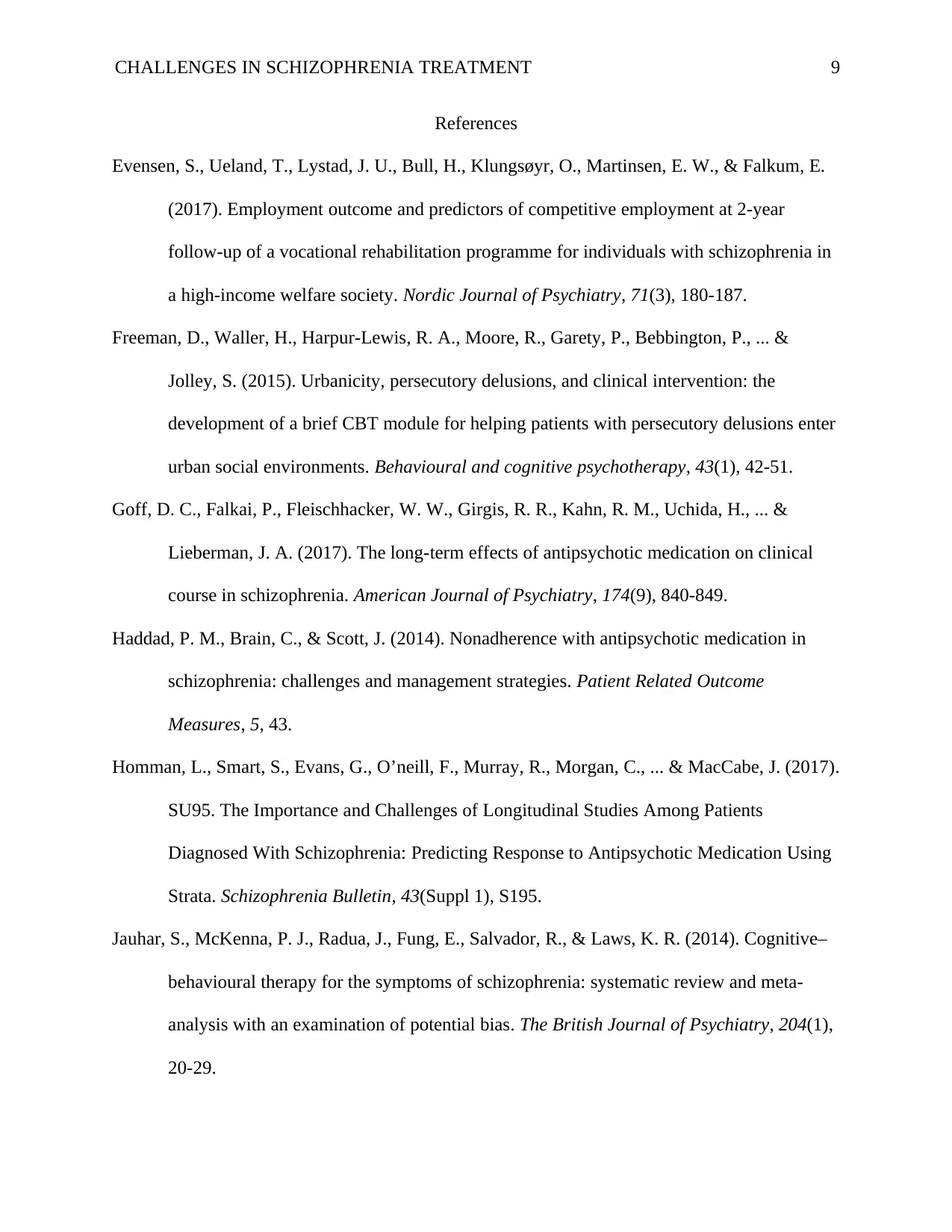
CHALLENGES IN SCHIZOPHRENIA TREATMENT 9
References
Evensen, S., Ueland, T., Lystad, J. U., Bull, H., Klungsøyr, O., Martinsen, E. W., & Falkum, E.
(2017). Employment outcome and predictors of competitive employment at 2-year
follow-up of a vocational rehabilitation programme for individuals with schizophrenia in
a high-income welfare society. Nordic Journal of Psychiatry, 71(3), 180-187.
Freeman, D., Waller, H., Harpur-Lewis, R. A., Moore, R., Garety, P., Bebbington, P., ... &
Jolley, S. (2015). Urbanicity, persecutory delusions, and clinical intervention: the
development of a brief CBT module for helping patients with persecutory delusions enter
urban social environments. Behavioural and cognitive psychotherapy, 43(1), 42-51.
Goff, D. C., Falkai, P., Fleischhacker, W. W., Girgis, R. R., Kahn, R. M., Uchida, H., ... &
Lieberman, J. A. (2017). The long-term effects of antipsychotic medication on clinical
course in schizophrenia. American Journal of Psychiatry, 174(9), 840-849.
Haddad, P. M., Brain, C., & Scott, J. (2014). Nonadherence with antipsychotic medication in
schizophrenia: challenges and management strategies. Patient Related Outcome
Measures, 5, 43.
Homman, L., Smart, S., Evans, G., O’neill, F., Murray, R., Morgan, C., ... & MacCabe, J. (2017).
SU95. The Importance and Challenges of Longitudinal Studies Among Patients
Diagnosed With Schizophrenia: Predicting Response to Antipsychotic Medication Using
Strata. Schizophrenia Bulletin, 43(Suppl 1), S195.
Jauhar, S., McKenna, P. J., Radua, J., Fung, E., Salvador, R., & Laws, K. R. (2014). Cognitive–
behavioural therapy for the symptoms of schizophrenia: systematic review and meta-
analysis with an examination of potential bias. The British Journal of Psychiatry, 204(1),
20-29.
References
Evensen, S., Ueland, T., Lystad, J. U., Bull, H., Klungsøyr, O., Martinsen, E. W., & Falkum, E.
(2017). Employment outcome and predictors of competitive employment at 2-year
follow-up of a vocational rehabilitation programme for individuals with schizophrenia in
a high-income welfare society. Nordic Journal of Psychiatry, 71(3), 180-187.
Freeman, D., Waller, H., Harpur-Lewis, R. A., Moore, R., Garety, P., Bebbington, P., ... &
Jolley, S. (2015). Urbanicity, persecutory delusions, and clinical intervention: the
development of a brief CBT module for helping patients with persecutory delusions enter
urban social environments. Behavioural and cognitive psychotherapy, 43(1), 42-51.
Goff, D. C., Falkai, P., Fleischhacker, W. W., Girgis, R. R., Kahn, R. M., Uchida, H., ... &
Lieberman, J. A. (2017). The long-term effects of antipsychotic medication on clinical
course in schizophrenia. American Journal of Psychiatry, 174(9), 840-849.
Haddad, P. M., Brain, C., & Scott, J. (2014). Nonadherence with antipsychotic medication in
schizophrenia: challenges and management strategies. Patient Related Outcome
Measures, 5, 43.
Homman, L., Smart, S., Evans, G., O’neill, F., Murray, R., Morgan, C., ... & MacCabe, J. (2017).
SU95. The Importance and Challenges of Longitudinal Studies Among Patients
Diagnosed With Schizophrenia: Predicting Response to Antipsychotic Medication Using
Strata. Schizophrenia Bulletin, 43(Suppl 1), S195.
Jauhar, S., McKenna, P. J., Radua, J., Fung, E., Salvador, R., & Laws, K. R. (2014). Cognitive–
behavioural therapy for the symptoms of schizophrenia: systematic review and meta-
analysis with an examination of potential bias. The British Journal of Psychiatry, 204(1),
20-29.
⊘ This is a preview!⊘
Do you want full access?
Subscribe today to unlock all pages.

Trusted by 1+ million students worldwide
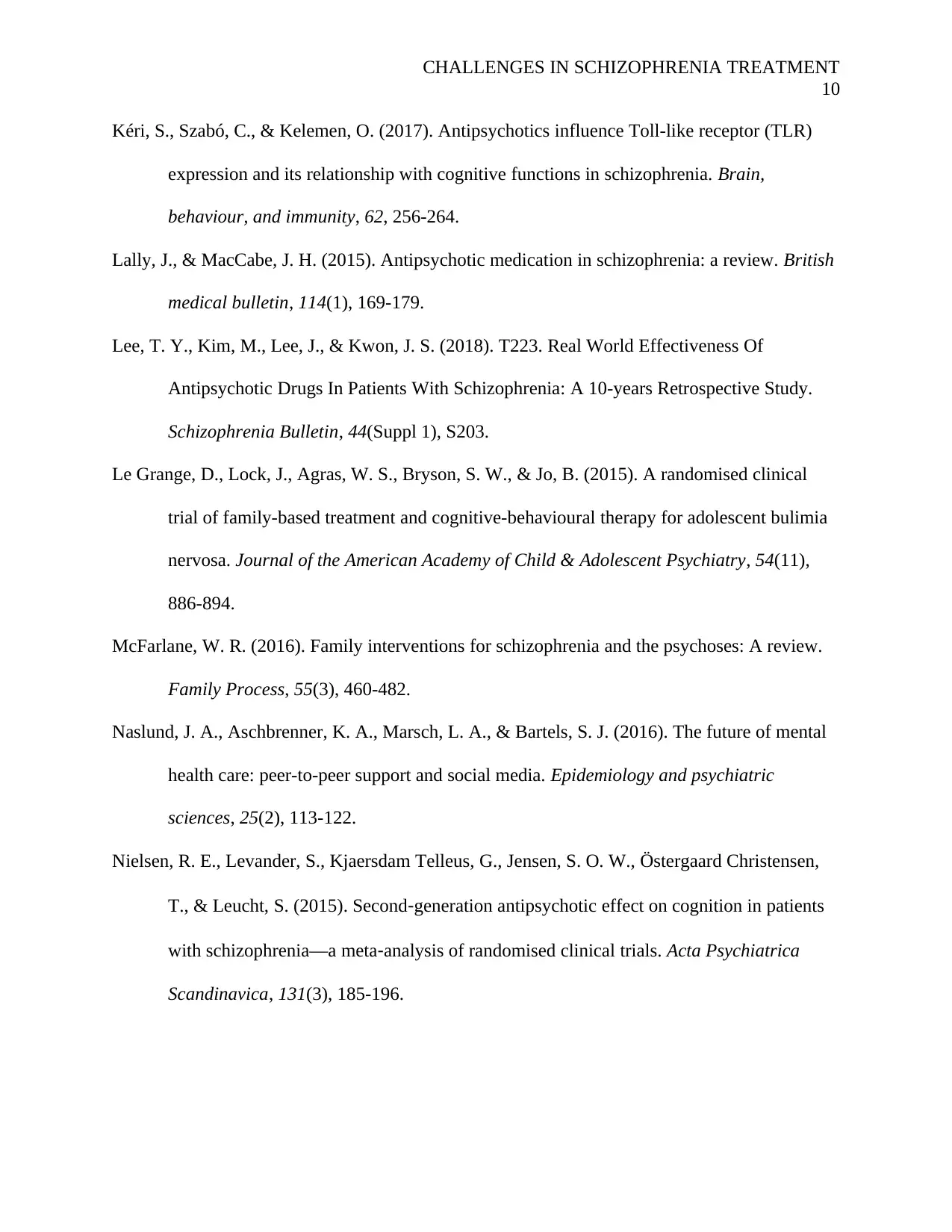
CHALLENGES IN SCHIZOPHRENIA TREATMENT
10
Kéri, S., Szabó, C., & Kelemen, O. (2017). Antipsychotics influence Toll-like receptor (TLR)
expression and its relationship with cognitive functions in schizophrenia. Brain,
behaviour, and immunity, 62, 256-264.
Lally, J., & MacCabe, J. H. (2015). Antipsychotic medication in schizophrenia: a review. British
medical bulletin, 114(1), 169-179.
Lee, T. Y., Kim, M., Lee, J., & Kwon, J. S. (2018). T223. Real World Effectiveness Of
Antipsychotic Drugs In Patients With Schizophrenia: A 10-years Retrospective Study.
Schizophrenia Bulletin, 44(Suppl 1), S203.
Le Grange, D., Lock, J., Agras, W. S., Bryson, S. W., & Jo, B. (2015). A randomised clinical
trial of family-based treatment and cognitive-behavioural therapy for adolescent bulimia
nervosa. Journal of the American Academy of Child & Adolescent Psychiatry, 54(11),
886-894.
McFarlane, W. R. (2016). Family interventions for schizophrenia and the psychoses: A review.
Family Process, 55(3), 460-482.
Naslund, J. A., Aschbrenner, K. A., Marsch, L. A., & Bartels, S. J. (2016). The future of mental
health care: peer-to-peer support and social media. Epidemiology and psychiatric
sciences, 25(2), 113-122.
Nielsen, R. E., Levander, S., Kjaersdam Telleus, G., Jensen, S. O. W., Östergaard Christensen,
T., & Leucht, S. (2015). Second‐generation antipsychotic effect on cognition in patients
with schizophrenia—a meta‐analysis of randomised clinical trials. Acta Psychiatrica
Scandinavica, 131(3), 185-196.
10
Kéri, S., Szabó, C., & Kelemen, O. (2017). Antipsychotics influence Toll-like receptor (TLR)
expression and its relationship with cognitive functions in schizophrenia. Brain,
behaviour, and immunity, 62, 256-264.
Lally, J., & MacCabe, J. H. (2015). Antipsychotic medication in schizophrenia: a review. British
medical bulletin, 114(1), 169-179.
Lee, T. Y., Kim, M., Lee, J., & Kwon, J. S. (2018). T223. Real World Effectiveness Of
Antipsychotic Drugs In Patients With Schizophrenia: A 10-years Retrospective Study.
Schizophrenia Bulletin, 44(Suppl 1), S203.
Le Grange, D., Lock, J., Agras, W. S., Bryson, S. W., & Jo, B. (2015). A randomised clinical
trial of family-based treatment and cognitive-behavioural therapy for adolescent bulimia
nervosa. Journal of the American Academy of Child & Adolescent Psychiatry, 54(11),
886-894.
McFarlane, W. R. (2016). Family interventions for schizophrenia and the psychoses: A review.
Family Process, 55(3), 460-482.
Naslund, J. A., Aschbrenner, K. A., Marsch, L. A., & Bartels, S. J. (2016). The future of mental
health care: peer-to-peer support and social media. Epidemiology and psychiatric
sciences, 25(2), 113-122.
Nielsen, R. E., Levander, S., Kjaersdam Telleus, G., Jensen, S. O. W., Östergaard Christensen,
T., & Leucht, S. (2015). Second‐generation antipsychotic effect on cognition in patients
with schizophrenia—a meta‐analysis of randomised clinical trials. Acta Psychiatrica
Scandinavica, 131(3), 185-196.
Paraphrase This Document
Need a fresh take? Get an instant paraphrase of this document with our AI Paraphraser
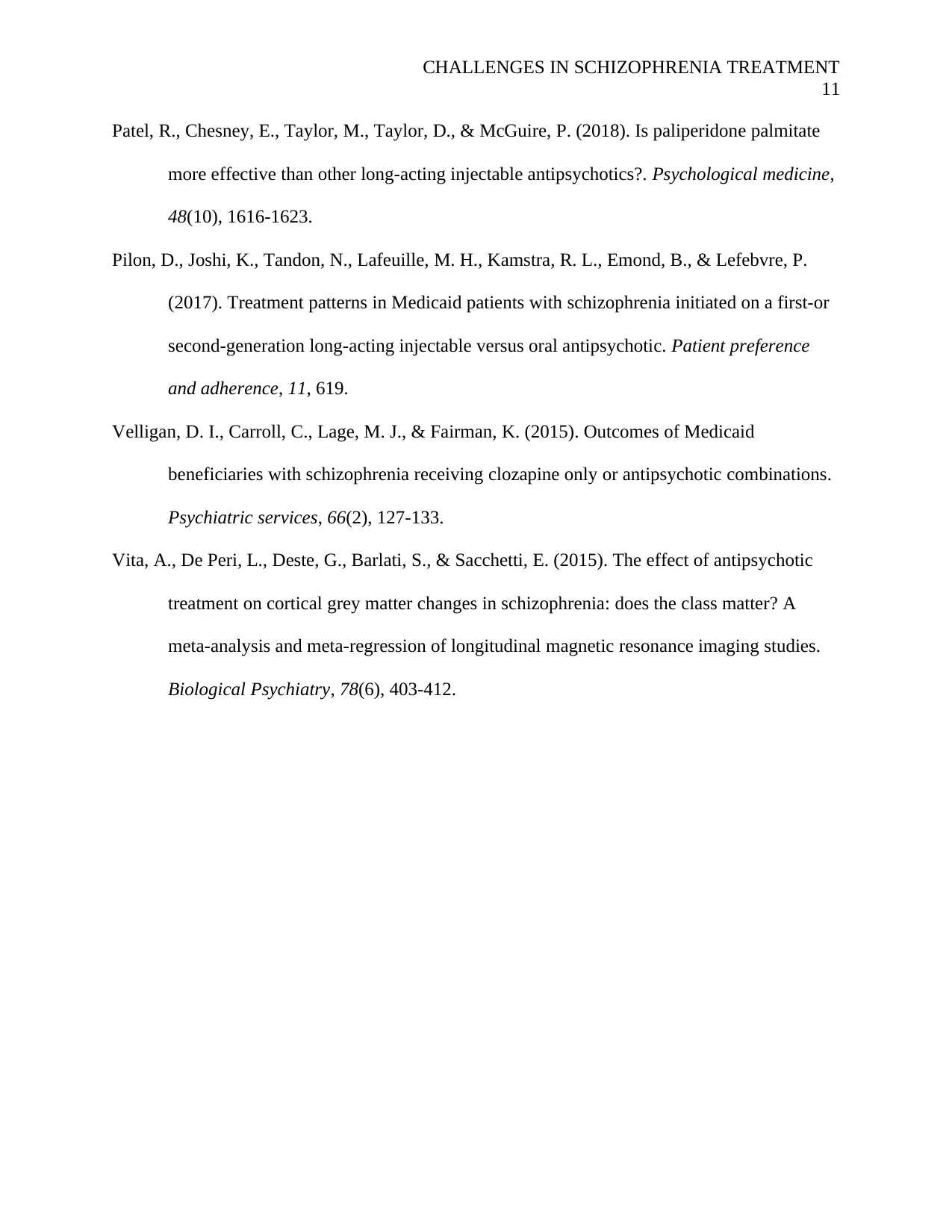
CHALLENGES IN SCHIZOPHRENIA TREATMENT
11
Patel, R., Chesney, E., Taylor, M., Taylor, D., & McGuire, P. (2018). Is paliperidone palmitate
more effective than other long-acting injectable antipsychotics?. Psychological medicine,
48(10), 1616-1623.
Pilon, D., Joshi, K., Tandon, N., Lafeuille, M. H., Kamstra, R. L., Emond, B., & Lefebvre, P.
(2017). Treatment patterns in Medicaid patients with schizophrenia initiated on a first-or
second-generation long-acting injectable versus oral antipsychotic. Patient preference
and adherence, 11, 619.
Velligan, D. I., Carroll, C., Lage, M. J., & Fairman, K. (2015). Outcomes of Medicaid
beneficiaries with schizophrenia receiving clozapine only or antipsychotic combinations.
Psychiatric services, 66(2), 127-133.
Vita, A., De Peri, L., Deste, G., Barlati, S., & Sacchetti, E. (2015). The effect of antipsychotic
treatment on cortical grey matter changes in schizophrenia: does the class matter? A
meta-analysis and meta-regression of longitudinal magnetic resonance imaging studies.
Biological Psychiatry, 78(6), 403-412.
11
Patel, R., Chesney, E., Taylor, M., Taylor, D., & McGuire, P. (2018). Is paliperidone palmitate
more effective than other long-acting injectable antipsychotics?. Psychological medicine,
48(10), 1616-1623.
Pilon, D., Joshi, K., Tandon, N., Lafeuille, M. H., Kamstra, R. L., Emond, B., & Lefebvre, P.
(2017). Treatment patterns in Medicaid patients with schizophrenia initiated on a first-or
second-generation long-acting injectable versus oral antipsychotic. Patient preference
and adherence, 11, 619.
Velligan, D. I., Carroll, C., Lage, M. J., & Fairman, K. (2015). Outcomes of Medicaid
beneficiaries with schizophrenia receiving clozapine only or antipsychotic combinations.
Psychiatric services, 66(2), 127-133.
Vita, A., De Peri, L., Deste, G., Barlati, S., & Sacchetti, E. (2015). The effect of antipsychotic
treatment on cortical grey matter changes in schizophrenia: does the class matter? A
meta-analysis and meta-regression of longitudinal magnetic resonance imaging studies.
Biological Psychiatry, 78(6), 403-412.
1 out of 11
Related Documents
Your All-in-One AI-Powered Toolkit for Academic Success.
+13062052269
info@desklib.com
Available 24*7 on WhatsApp / Email
![[object Object]](/_next/static/media/star-bottom.7253800d.svg)
Unlock your academic potential
Copyright © 2020–2025 A2Z Services. All Rights Reserved. Developed and managed by ZUCOL.





